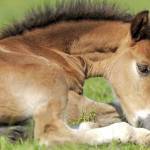Controlling the Spread of Foal Pneumonia

One of the most common illnesses in foals is pneumonia caused by Rhodococcus equi. The disease often causes a growth slump, and treatment may be long and expensive. Infection can result when foals inhale paddock dust contaminated with manure from infected foals, and control has been aimed at reducing dust in turnout areas by allowing foliage to grow higher before mowing.
The environment in which foals are managed may have a major influence on the level of airborne R. equicontamination. To investigate this influence, air samples from paddocks were compared with samples taken from holding pens where many foals are kept in closely spaced groups on Australian horse farms. Concentrations of R. equi in outdoor air varied by humidity, air temperature, and forage height, but all paddock air had far lower concentrations than the air in holding pens containing groups of foals.
Although each season’s earliest cases of foal pneumonia are likely to be related to R. equi picked up from the environment, cases occurring later in the season are probably the result of transmission from infected to uninfected foals.
Control might be most effective if it is targeted toward reducing the number of foals in a holding pen and also the time foals spend in penned groups. Some reduction in disease incidence might also be achieved by identifying and quarantining both clinically and subclinically infected foals.








